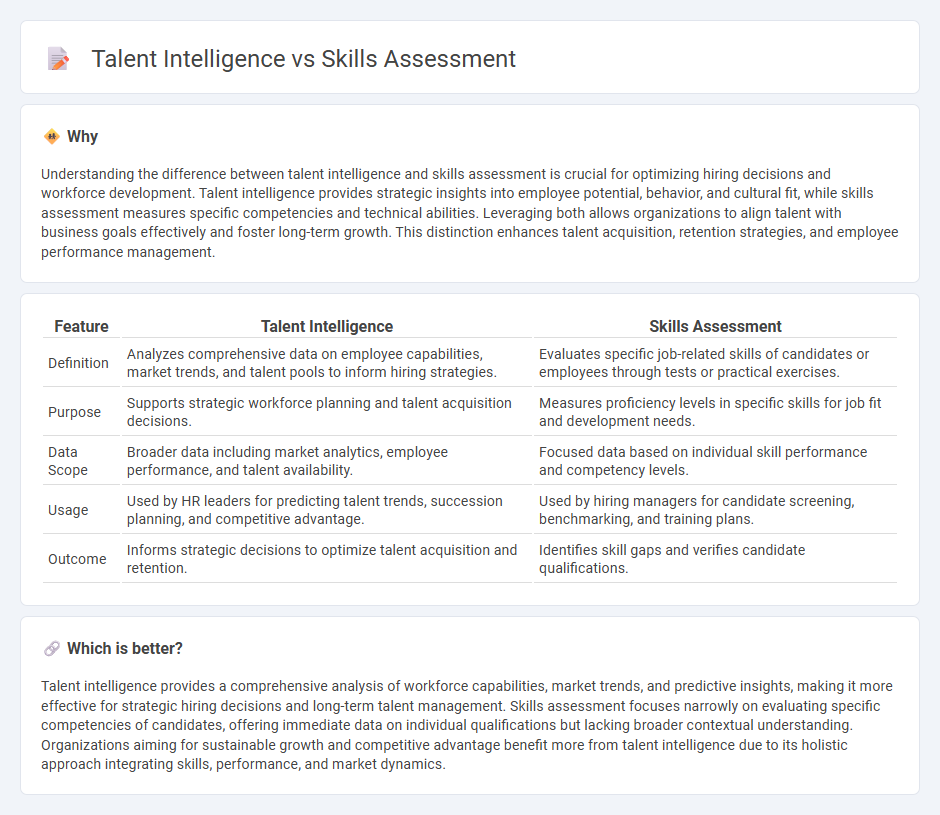
Talent intelligence leverages data analytics and artificial intelligence to provide comprehensive insights into workforce capabilities, trends, and potential, enabling strategic talent acquisition and management. Skills assessment focuses on evaluating an individual's specific competencies and proficiencies through tests, simulations, and practical tasks to determine job readiness and development needs. Explore how integrating talent intelligence with skills assessment can optimize recruitment and employee development strategies.
Why it is important
Understanding the difference between talent intelligence and skills assessment is crucial for optimizing hiring decisions and workforce development. Talent intelligence provides strategic insights into employee potential, behavior, and cultural fit, while skills assessment measures specific competencies and technical abilities. Leveraging both allows organizations to align talent with business goals effectively and foster long-term growth. This distinction enhances talent acquisition, retention strategies, and employee performance management.
Comparison Table
| Feature | Talent Intelligence | Skills Assessment |
|---|---|---|
| Definition | Analyzes comprehensive data on employee capabilities, market trends, and talent pools to inform hiring strategies. | Evaluates specific job-related skills of candidates or employees through tests or practical exercises. |
| Purpose | Supports strategic workforce planning and talent acquisition decisions. | Measures proficiency levels in specific skills for job fit and development needs. |
| Data Scope | Broader data including market analytics, employee performance, and talent availability. | Focused data based on individual skill performance and competency levels. |
| Usage | Used by HR leaders for predicting talent trends, succession planning, and competitive advantage. | Used by hiring managers for candidate screening, benchmarking, and training plans. |
| Outcome | Informs strategic decisions to optimize talent acquisition and retention. | Identifies skill gaps and verifies candidate qualifications. |
Which is better?
Talent intelligence provides a comprehensive analysis of workforce capabilities, market trends, and predictive insights, making it more effective for strategic hiring decisions and long-term talent management. Skills assessment focuses narrowly on evaluating specific competencies of candidates, offering immediate data on individual qualifications but lacking broader contextual understanding. Organizations aiming for sustainable growth and competitive advantage benefit more from talent intelligence due to its holistic approach integrating skills, performance, and market dynamics.
Connection
Talent intelligence integrates data analytics to identify workforce capabilities, enabling precise skills assessment against organizational needs. Skills assessment tools measure current competencies and predict future potential, driving informed hiring and development decisions. This connection enhances workforce optimization by aligning talent capabilities with strategic business objectives.
Key Terms
Competency Mapping
Skills assessment evaluates individual abilities through tests and performance metrics, providing a snapshot of current competencies. Talent intelligence leverages data analytics and AI to provide deeper insights into workforce potential, aligning competencies with organizational goals and future needs. Explore how integrating these approaches enhances competency mapping for strategic talent management.
Workforce Analytics
Skills assessment provides a snapshot of employee capabilities by evaluating current competencies, while talent intelligence offers a comprehensive analysis of workforce potential through data-driven insights and predictive analytics. Workforce analytics leverages talent intelligence to optimize talent acquisition, development, and retention strategies by identifying skill gaps and forecasting future workforce needs. Explore our detailed guide to understand how integrating skills assessment with talent intelligence transforms workforce management.
Gap Analysis
Skills assessment evaluates individual competencies to identify specific gaps in knowledge and abilities within a workforce, providing measurable data for targeted development. Talent intelligence offers a broader strategic perspective by analyzing workforce capabilities, market trends, and potential talent pools to align organizational goals with talent acquisition and retention. Explore how integrating both approaches enhances gap analysis and drives informed talent management decisions.
Source and External Links
Skill Assessment Tests: Definition and Examples | Indeed.com - Skills assessment tests evaluate candidates' abilities, including hard skills, work samples, cognitive ability, and personality, often used by employers during hiring to predict job performance.
What Is A Skills Assessment? | HR Glossary - Visier - A skills assessment evaluates an employee or candidate's proficiency and knowledge for a job through tests, interviews, or simulations, used for hiring, development, and succession planning.
Skills assessment - National Careers Service - This self-reflective assessment helps individuals identify their motivations and skills through multiple-choice questions, offering career suggestions based on personal preferences and strengths.
 dowidth.com
dowidth.com